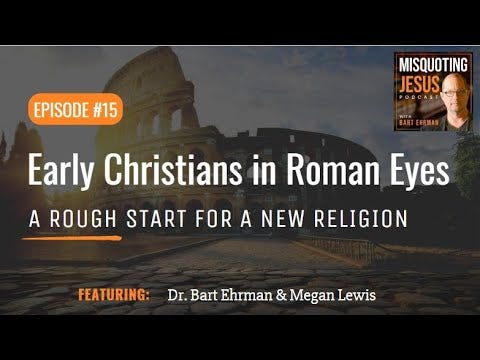Roman Edict of Toleration (Edict of Serdica) and Western liberal concepts of freedom of religion
Roman Emperor Valerius [Galerius] in 313 CE issued an Edict of Toleration permitting Christians to practice their religion without state persecution: "the first time ever in history a major government issued an declaration of freedom of religion. Follow your conscience, do what you want, and the government is not going to intervene any more."
That’s the evaluation of Biblical historian Bart Ehrman.1
More background:
The Diocletianic or Great Persecution was the last and most severe persecution of Christians in the Roman Empire.[1] In 303, the emperors Diocletian, Maximian, Galerius, and Constantius issued a series of edicts rescinding Christians' legal rights and demanding that they comply with traditional religious practices. Later edicts targeted the clergy and demanded universal sacrifice, ordering all inhabitants to sacrifice to the gods. The persecution varied in intensity across the empire—weakest in Gaul and Britain, where only the first edict was applied, and strongest in the Eastern provinces. Persecutory laws were nullified by different emperors (Galerius with the Edict of Serdica in 311) at different times, but Constantine and Licinius' Edict of Milan in 313 has traditionally marked the end of the persecution.2
Religious tolerance is a good thing in the general democratic view of the world. And that makes all the precedents interesting.
On the other hand, how much influence this particular edict in the year 311 had on later governments and political theorists. Much more proximate causes in the Western context were the Wars of Religion in the 16th century and the Thirty Years War in the 17th, the latter having a major religious (Catholic vs. Protestant) component.
Thomas Hobbes (1588-1679) was reinforced in his opinion that the monarch should be the ultimate governing authority by experiencing the sectarian content of the English Civil Wars (1642–51)3, which he describes here (complete with now-archaic spellings, like using “u” for today’s “v”):
A. The seducers were of diuers sorts. One sort were Ministers, Ministers (as they call themselues) of Christ, and sometimes in their Sermons to the people Gods Embassadors, pretending to haue a right from God to gouerne euery one his Parish; and their Assembly the whole nation.
2. Secondly there were a very great number, though not comparable to the other, which notwithstanding that the Popes power in England both Temporall and Ecclesiasticall had been by Act of Parliament abolished, did still retaine a beleefe that we ought to be gouerned by the Pope whom they pretended to be the Vicar of Christ, and in the right of Christ to be the gouernour of all Christian people, and these were knowne by the name of Papists , as the Ministers I mentioned before were commonly called Presbyterians.
3. Thirdly there were not a few who in the beginning of the troubles were not discouered, but shortly after declared themselues for a Liberty in Religion, and those of different opinions one from another; some of them (because they would haue all congregations free and independent vpon one another) were called Independents. Others that held Baptisme to infants, and such as vnderstood not into what they are baptized to be ineffectuall, were called therefore Anabaptists . Others that held that Christ’s Kingdome was at this time to begin vpon earth, were called Fifth Monarchy men; besides diuers other Sects as Quakers, Adamits etc whose names and peculiar doctrins I do not well remember. And these were the enemies which arose against his Maiesty from the priuate interpretations of the Scripture exposed to euery mans scanning in his Mother tongue.4
As Rainer Forst observes of Hobbes’ “Behemoth (1668), in his analysis of the English Civil War, leaves no doubt that the religious parties, whether ‘papists,’ Presbyterians, or independents, are all to blame for the destruction of the state” during the English Civil War.5
So it took quite a while after the Edict of Serdica until the Europeans of the post-Roman Empire centuries figured out that it might be preferable for governments to focus on keeping peace and order rather than backing one or the other side in armed conflicts over how to worship God. Or not to worship, as the case may be.
Ehrman, Bart D. (2023): Early Christians in Roman Eyes (28:00ff). Bart D. Ehrman YouTube channel 01/31/2023. (Accessed: 2023-10-04).
Diocletianic Persecution. Wikipedia 04/19/2023. <https://en.wikipedia.org/w/index.php?title=Diocletianic_Persecution&oldid=1150698901> (Accessed: 2023-26-04).
Burgess, Glenn (1998): Was the English Civil War a War of Religion? Huntington Library Quarterly 61:1998, 173-201. <https://www.jstor.org/stable/3817797> (Accessed: 27.04.2023). The period 1642-51 is also referred to as the Civil War (singular) and the Great Rebellion. See also: Ohlmeyer, Jane H. (2023): English Civil Wars. Britannica Online 01/08/2023. <https://www.britannica.com/event/English-Civil-Wars> (Accessed: 2023-27-04).
Hobbes, Thomas: In: Seaward, Paul (ed.) Behemoth or The Long Parliament, 2009, 109 (Clarendon Edition of the Works of Thomas Hobbes, Vol. 12). Oxford: Clarendon Press.
Forst, Rainer (2003): Toleranz im Konflikt. Geschichte, Gehalt und Gegenwart eines umstrittenen Begriffs, 245. Frankfurt am Main: Suhrkamp Verlag. My translation from the German.


